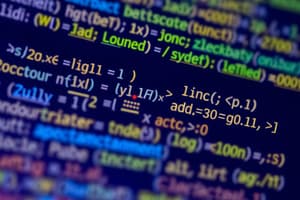Podcast
Questions and Answers
What is the operator used for incrementing a variable by 1?
What is the operator used for incrementing a variable by 1?
- --
- =>
- .+
- ++ (correct)
Which operator is used for modulus assignment?
Which operator is used for modulus assignment?
- ++=
- =
- -=
- %= (correct)
Which operator has the highest precedence?
Which operator has the highest precedence?
- () (correct)
- -
- +
- *
What does typecasting refer to?
What does typecasting refer to?
Which of the following is true about implicit typecasting?
Which of the following is true about implicit typecasting?
What is the associativity of the assignment operator (=)?
What is the associativity of the assignment operator (=)?
Which operator is used for multiplication assignment?
Which operator is used for multiplication assignment?
If two operators have the same precedence, what determines their evaluation order?
If two operators have the same precedence, what determines their evaluation order?
What is the purpose of a semicolon in C?
What is the purpose of a semicolon in C?
Which header file is commonly used for working with date and time in C?
Which header file is commonly used for working with date and time in C?
Which control flow statement is used to execute a block of code repeatedly until a condition is met?
Which control flow statement is used to execute a block of code repeatedly until a condition is met?
Which of the following is a valid data type in C?
Which of the following is a valid data type in C?
What is the importance of proper formatting and indentation in C code?
What is the importance of proper formatting and indentation in C code?
What is the correct syntax for declaring a function in C?
What is the correct syntax for declaring a function in C?
Which of the following is a valid C statement?
Which of the following is a valid C statement?
Syntax errors in C programming are identified by which component?
Syntax errors in C programming are identified by which component?
What is the return type of the main() function in C?
What is the return type of the main() function in C?
Which component of a C program contains the actual implementation of functions?
Which component of a C program contains the actual implementation of functions?
How can command-line arguments be passed to a C program?
How can command-line arguments be passed to a C program?
What is the significance of the return 0; statement in the main() function?
What is the significance of the return 0; statement in the main() function?
What is the purpose of headers in C programming?
What is the purpose of headers in C programming?
Which header file provides functions for input/output operations?
Which header file provides functions for input/output operations?
Which header file is used for string manipulation?
Which header file is used for string manipulation?
Which header file provides functions for mathematical calculations?
Which header file provides functions for mathematical calculations?
What is the correct way to call a function that returns a value?
What is the correct way to call a function that returns a value?
What is a characteristic of a recursive function?
What is a characteristic of a recursive function?
Where are local variables typically declared?
Where are local variables typically declared?
What defines the scope of a local variable?
What defines the scope of a local variable?
What best describes the scope of a global variable?
What best describes the scope of a global variable?
What is the base case of a recursive function?
What is the base case of a recursive function?
Why are recursive functions often used?
Why are recursive functions often used?
Compared to iterative solutions, recursive solutions are generally considered:
Compared to iterative solutions, recursive solutions are generally considered:
What is the purpose of conditional statements?
What is the purpose of conditional statements?
What will be the output if 'num' is 5 in the provided code?
What will be the output if 'num' is 5 in the provided code?
What does the 'break' statement do in a switch statement?
What does the 'break' statement do in a switch statement?
Which operator checks if two values are equal?
Which operator checks if two values are equal?
Which operator is used to check if two values are not equal?
Which operator is used to check if two values are not equal?
What does short-circuit evaluation entail?
What does short-circuit evaluation entail?
Which operator checks if the left operand is greater than the right operand?
Which operator checks if the left operand is greater than the right operand?
What is the purpose of using logical operators with short-circuit evaluation?
What is the purpose of using logical operators with short-circuit evaluation?
Flashcards are hidden until you start studying
Study Notes
C Programming Operators
- The assignment operator
=assigns a value to a variable. - The
+=operator increments a variable by a specified value and assigns the result back to the variable. - The
-=operator decrements a variable by a specified value and assigns the result back to the variable. - The
*=operator multiplies a variable by a specified value and assigns the result back to the variable. - The
%=operator calculates the modulus (remainder) of a variable divided by a specified value and assigns the result back to the variable. - The
++operator increments a variable by 1. - The
--operator decrements a variable by 1. - The typecasting operator converts a value from one data type to another.
- Implicit typecasting is performed automatically by the compiler.
- The parentheses operator
()has the highest precedence in C. - The associativity of the assignment operator
=is from right to left. - The precedence of operators determines the order in which they are evaluated in an expression.
- When operators have the same precedence, their associativity determines the order of evaluation.
C Programming Basics
- The
stdio.hheader file provides functions for input/output operations. - The
stdlib.hheader file provides functions for general utility tasks. - The
string.hheader file provides functions for string manipulation. - The
math.hheader file provides functions for mathematical calculations. - The
time.hheader file provides functions for working with dates and times. - The semicolon
;is used to terminate a statement in C. - The
intdata type represents integers. - The
floatdata type represents floating-point numbers. - The
chardata type represents characters. - The
main()function is the entry point of a C program and typically returns an integer value. A return value of 0 generally indicates successful program execution. - Headers in C programming provide function prototypes and type definitions, making the code more readable and preventing errors.
- Global variables are declared outside any function and have program-wide scope.
- Local variables are declared inside a function and have function-specific scope.
- A recursive function calls itself directly or indirectly.
- The base case of a recursive function is the simplest case that can be solved directly, preventing infinite recursion.
- Recursive functions are often used to solve problems that can be broken down into smaller, similar subproblems.
Conditional Statements and Control Flow
- Conditional statements allow a program to make decisions and execute different code blocks based on the value of an expression.
- Conditional statements are typically used in conjunction with logical operators, such as
&&(AND),||(OR), and!(NOT). - The
ifstatement executes a block of code if a condition is true. - The
elsestatement executes a block of code if the condition in the precedingifstatement is false. - The
else ifstatement provides additional conditions to evaluate if the previousiforelse ifconditions are false. - The
switchstatement allows a program to branch to different sections of code based on the value of a variable. - The
breakstatement exists theswitchstatement immediately. - Short-circuit evaluation means that the second operand of a logical operator is not evaluated if the outcome can be determined by the first operand.
Studying That Suits You
Use AI to generate personalized quizzes and flashcards to suit your learning preferences.




